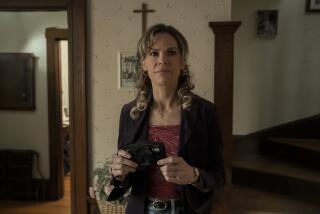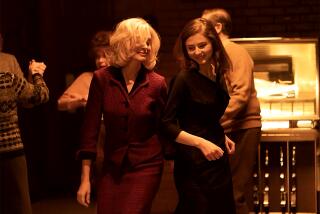âAngelâ Takes Ultra-Romantic Approach
Michael Rymerâs âAngel Babyâ swept the 1995 Australian Film Institute Awards in every major category and won at least five other Down Under prizes.
On the one hand, all this acclaim testifies to Rymerâs considerable skill at shamelessly manipulating audience emotions with a sentimental and ultra-romantic treatment of mentally ill lovers, not to mention the potent charisma of his young stars, John Lynch and Jacqueline McKenzie. On the other hand, such acclaim is not an encouraging sign for the once-groundbreaking Australian cinema.
Dark and lean, looking like a twentysomething Sam Waterston, Lynchâs Harry is a sweet-natured guy who lives with caring brother (Colin Friels) and sister-in-law (Deborra-Lee Furness) while regularly attending group therapy and taking drugs that keep at bay the voices that only he hears. He seems to be doing fine when he meets a new group member, Kate (McKenzie).
Sheâs an auburn-haired beauty with porcelain skin who was raped in childhood by her father and whose mental equilibrium is markedly more fragile than Harryâs. Kate believes she is watched over by a guardian angel, whom she calls Astral, who communicates with her through Vanna Whiteâs equivalent in the Australian version of âWheel of Fortune.â She also believes that anybody who touches her blood has instant power over her. Both Kate and Harry are slaves to numerology.
*
The pair swiftly fall passionately in love, and they want everything a normal couple wants, right now. Each receives some kind of government stipend, and Harry talks his way into a computer job while Kate does laundry. They move into an apartment that looks like some sort of government housing structure. Harryâs relatives and their therapists are understandably concerned that theyâre moving too fast, but they seem to be coping--until Kate becomes pregnant.
Thereâs the makings of a good movie here, but Rymer goes for a swooningly romantic Romeo-and-Juliet approach thatâs sure to turn off everyone not caught up in the movieâs sugary spell. Rymer tries for a love-conquers-all declaration when his story is telling us the reverse: that love, wonderful and welcome as it is, is not enough and that those with mental problems need to be especially careful about being able to deal with powerful emotions and responsibilities.
Rymer piles on the coupleâs escalating disintegration so extravagantly that you find yourself wondering just how much the government tab will be for picking up the pieces of their lives. So totally self-absorbed are Harry and Kate, and so big a burden do they become on others, that itâs a terrific relief when Harryâs brother finally loses his temper. If only, alas, Harry and Kate were as real as Harryâs relatives.
When Harry and Kate make love, which is frequently, they go in for lots of lighted candles. When you think about it, love by excessive candlelight has become such a cliche that itâs got to be a sure sign of a bad movie.
* Unrated. Times guidelines: The film has considerable nudity, lovemaking, some strong language and harrowing depictions of mental illness.
(BEGIN TEXT OF INFOBOX / INFOGRAPHIC)
âAngel Babyâ
John Lynch: Harry
Jacqueline McKenzie: Kate
Colin Friels: Morris
Deborra-Lee Furness: Louise
A Cinepix Film Properties presentation. Writer-director Michael Rymer. Producers Timothy White, Jonathan Shteinman. Cinematographer Ellery Ryan. Editor Danny Cooper. Costumes Kerri Mazzocco. Music coordinator Chris Gough. Production designer Chris Kennedy. Art director Hugh Bateup. Running time: 1 hour, 45 minutes.
* Exclusively at the Westside Pavilion, 10800 W. Pico Blvd., (310) 475-0202; the Los Feliz 3, 1822 N. Vermont Ave., (213) 664-2169; and Town Center 4, South Coast Plaza, Costa Mesa, (714) 751-4184.
More to Read
Only good movies
Get the Indie Focus newsletter, Mark Olsen's weekly guide to the world of cinema.
You may occasionally receive promotional content from the Los Angeles Times.










